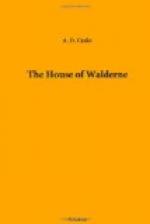“What! didst thou see such a sight, a young boy like thee?”
“Yes,” said Martin innocently; “why shouldn’t I?”
There was a pause.
“Poor child,” said the prior.
“My boy, thou should say ‘my lord,’ when addressing a titled earl.”
“I did not know, my lord. I beg pardon, my lord, if I have been rude, my lord.”
“Nay, thou hast already made up the tale of ‘my lords.’”
“You will not let them get me again, my lord?”
“They couldn’t get in here, and tomorrow, if the storm cease, I shall take thee away with me. Fear not, my poor boy. If thou hast for a while lost a mother, thou hast found a father.”
The boy sighed. Affection is not so easily transferred; and the earl quite comprehended that sigh; as a strange interest, almost unaccountable, he thought, sprang up in his manly breast for the little nestling, thrown so strangely upon his protection and care.
Brave as a lion with the proud, gentle as a lamb with the weak and defenceless, such was Simon de Montfort, an embodiment of true greatness—the union of strength with love. Both Martin and Hubert were fortunate in their new lord.
“There sounds the vesper bell. Wilt thou with me to the chapel?” said the prior.
Thither both earl and prior proceeded. It was Wednesday evening; the psalms were then apportioned to the days of the week, not of the month, and the first this night was the one hundred and twenty-seventh:
Except the Lord build the house,
their labour is but vain that build it.
Except the Lord keep the city,
the watchman watcheth but in vain.
And again:
Lo, children and the fruit of the womb
are an heritage and gift that cometh of the Lord.
The two boys whom he had so strangely adopted came to the mind of the earl; they were not of his blood, yet they might be “an heritage and gift of the Lord.” And as the psalms rose and fell to the rugged old Gregorian tones—old even then—their words seemed to Simon de Montfort as the voice of God.
Oh! how rough, yet how grand that old psalmody was! Modern ears call its intervals harsh, its melodies crude, but it spoke to the heart with a power which our sweet modern chants often fail to exercise over us, as we chant the same sacred lays.
_______________________________________________________
_______
Nightfall—night hung like a pall over the island, over the moat, over the silent heath and woods; the snow kept falling, falling; the fires kept blazing in the huge hearths; and the bell kept tolling until curfew time, by the prior’s order, that if any were lost in the wild night they might be guided by its sound to shelter.
The earl slept soundly in his little monastic cell that night, and in the morning he perceived the light of a bright dawn through the narrow window; anon the winter’s sun rose, all glorious, and the frost and snow sparkled like the sheen of diamonds in its beams. The bell was just ringing for the Chapter Mass, the mass of obligation to all the brotherhood, and the only one sung—during the day—in contradistinction to the low, or silent, masses—which equalled the number of the brethren in full orders, of whom there were not more than five or six.




